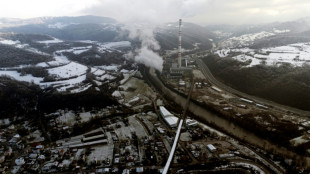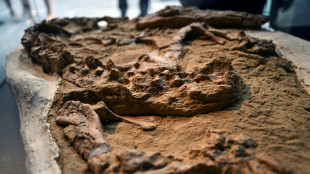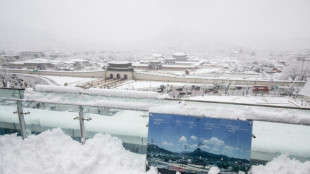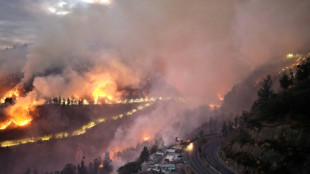
-
 French govt ready for budget concessions to avoid financial 'storm'
French govt ready for budget concessions to avoid financial 'storm'
-
Hong Kong airport third runway takes off

-
 In Bosnia, the path to renewables runs through its coal mines
In Bosnia, the path to renewables runs through its coal mines
-
China probes top military official for corruption

-
 Syria war monitor says more than 130 dead in army-jihadist clashes
Syria war monitor says more than 130 dead in army-jihadist clashes
-
China says top military official Miao Hua under investigation

-
 Taiwan president's plan to stop over in Hawaii, Guam angers Beijing
Taiwan president's plan to stop over in Hawaii, Guam angers Beijing
-
Russian attacks leave one million Ukrainians without power

-
 Markets mixed after subdued pre-holiday shift on Wall St
Markets mixed after subdued pre-holiday shift on Wall St
-
What would an ICC arrest warrant for Myanmar's junta chief mean?

-
 China says top military official Miao Hua suspended, under investigation
China says top military official Miao Hua suspended, under investigation
-
Taiwan's Lai to stop over in Hawaii, Guam during Pacific trip

-
 Namibia extends voting after logistical issues
Namibia extends voting after logistical issues
-
LIV Golf's Herbert in charge at Australian Open, Smith two back

-
 Despair in Sweden as gangs recruit kids as contract killers
Despair in Sweden as gangs recruit kids as contract killers
-
Russia launches massive aerial attack on Ukraine's energy sector

-
 Peru scientists unveil crocodile fossil up to 12 million years old
Peru scientists unveil crocodile fossil up to 12 million years old
-
At plastic treaty talks, no united front for industry

-
 Williamson falls for 93 as England fight back in first Test
Williamson falls for 93 as England fight back in first Test
-
South Korea officials say three dead in heavy snowfall

-
 High-flying Fiorentina face test of Scudetto credentials with Inter visit
High-flying Fiorentina face test of Scudetto credentials with Inter visit
-
Verstappen switches focus to re-boot defence of F1 teams' title

-
 UK filmmaker Richard Curtis makes first foray into animation
UK filmmaker Richard Curtis makes first foray into animation
-
Countrywide air alert in Ukraine due to missile threat

-
 China's military corruption crackdown explained
China's military corruption crackdown explained
-
Primark boss defends practices as budget fashion brand eyes expansion

-
 Williamson eyes ton as New Zealand take control against England
Williamson eyes ton as New Zealand take control against England
-
Norway faces WWF in court over deep sea mining

-
 Trump, Sheinbaum discuss migration in Mexico amid tariff threat
Trump, Sheinbaum discuss migration in Mexico amid tariff threat
-
Asian markets mixed after subdued pre-holiday shift on Wall St

-
 Orban's soft power shines as Hungary hosts Israeli match
Orban's soft power shines as Hungary hosts Israeli match
-
'Retaliate': Trump tariff talk spurs global jitters, preparations

-
 'Anti-woke' Americans hail death of DEI as another domino topples
'Anti-woke' Americans hail death of DEI as another domino topples
-
Trump hails migration talks with Mexico president

-
 Truckers strike accusing Wagner of driver death in Central African Republic
Truckers strike accusing Wagner of driver death in Central African Republic
-
London police say 90 victims identified in new Al-Fayed probe

-
 Air pollution from fires linked to 1.5 million deaths a year
Air pollution from fires linked to 1.5 million deaths a year
-
Latham falls for 47 as New Zealand 104-2 in first England Test

-
 US tells Ukraine to lower conscription age to 18
US tells Ukraine to lower conscription age to 18
-
Judge denies Sean Combs bail: court order

-
 Suarez extends Inter Miami stay with new deal
Suarez extends Inter Miami stay with new deal
-
Perfect Liverpool on top of Champions League, Dortmund also among winners

-
 Liverpool more 'up for it' than beaten Madrid, concedes Bellingham
Liverpool more 'up for it' than beaten Madrid, concedes Bellingham
-
Aston Villa denied late winner against Juventus

-
 Mexico president hails 'excellent' Trump talks after US tariff threat
Mexico president hails 'excellent' Trump talks after US tariff threat
-
Leicester set to appoint Van Nistelrooy - reports

-
 Coffee price heats up on tight Brazil crop fears
Coffee price heats up on tight Brazil crop fears
-
Maeda salvages Celtic draw against Club Brugge

-
 Villa denied late winner against Juventus
Villa denied late winner against Juventus
-
Dortmund beat Zagreb to climb into Champions League top four


Gaza's women and girls see no escape from violence
Seventeen-year-old Istabraq Baraka fell pregnant soon after her wedding in the Gaza Strip. Three months later her husband killed her.
"She died from a severe beating, which caused bleeding on the brain and lungs and broken ribs," said her mother Nazmiya.
Sitting with her husband Suleiman in a garden in Abassan, near the city of Khan Yunis in the south of the Palestinian territory, the 53-year-old talks at lightning speed about last year's killing of one of her two daughters, as well as the loss of an unborn grandchild.
Istabraq's father wipes tears away with the corner of a red-and-white keffiyeh wrapped around his head.
He laments the slow pace of legal proceedings since his daughter's husband handed himself in to the police shortly after the killing.
"The perpetrator admitted his crime, a year and a month until now and nothing's happened," said the 70-year-old.
Femicide is on the rise in Gaza, according to figures from the Women's Centre for Legal Aid and Counselling, a Palestinian civil society group.
The organisation registered six killings and suspicious deaths related to domestic violence in 2019, a figure which rose to 19 the following year.
UN Women said the situation worsened at the onset of the coronavirus pandemic in 2020, which resulted in the "lockdown of survivors of violence with their abusers".
Ayah Alwakil, a lawyer from the Palestinian Centre for Human Rights, said women can consider violence from their husbands normal behaviour in Gaza's patriarchal society, which has been controlled by the Hamas Islamist group since 2007.
"Some women don't know their rights and some others are afraid of going to court, for lack of family support," she added.
The Palestinian Central Bureau of Statistics said 38 percent of women in Gaza faced physical or psychological violence from their husbands in 2019, but Alwakil estimated the true figure to be far higher.
- Tied up, left to die -
Men convicted of killing their wives can be jailed or face the death penalty. But the sentence is reduced if they commit a so-called "honour killing", in which a relative is murdered because they are deemed to have brought shame to the family.
UN Women says such "outdated and discriminatory laws" impede justice.
Additionally, those seeking to escape domestic violence risk losing their children.
If a wife obtains a divorce, custody passes to the ex-husband once a daughter turns 11 or a son reaches nine.
Noha Khaziq, 31, stayed with her abusive husband because they had four children.
He killed her in February.
"Her husband tied her up and left her at home so that she couldn't escape and get out. When he returned she was dead," said her brother Abdelaziz, who shares his sister's green eyes.
"We feel satisfied with the death sentence ruling against the husband, five months after the heinous crime, but we demand the sentence be enforced quickly," said the 28-year-old.
The Khaziq family has not seen Noha's children since she was killed, because custody was granted to their father's relatives.
- 'Not on women's side' -
Fifteen years since the Israeli-led blockade of Gaza began, it is almost impossible for women fleeing violence to leave the Palestinian enclave.
In a territory home to 2.3 million residents, around 40 women are staying in only two specialised refuges.
When AFP visited one of them, a woman with bruises covering one side of her face sat in a corner. She was about to return to her husband, rather than risk losing access to her children.
"The law is not on women's side all the time in the Gaza Strip," said Aziza Elkahlout, a spokeswoman for the social development ministry which runs one of the refuges.
"We thought of opening the safe house because of the injustice women are exposed to," she added, blaming the Israeli blockade for Gaza's dire living conditions.
But such reasoning is inadequate for Suleiman Baraka, who says the authorities are partly responsible for his daughter's killing.
"The government helps the offender because it doesn't take any immediate decisions," said Istabraq's father.
He is reminded of his daughter every time he reaches for his phone, whose screen shows a photo of him with his two girls.
More than a year since Istabraq was killed, he warned that delays in reaching justice only "encourage criminals".
E.Schubert--BTB

